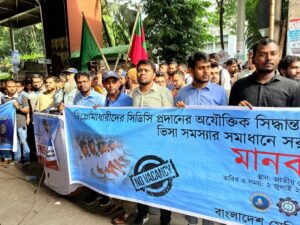Bangladesh’s Continuous Discharge Certificate (CDC) Crisis and Maritime Education Reform

Human chains against controversial circular authorizing CDC issuance to diploma holders from non-approved polytechnic institutions
By Ghulam Suhrawardi
To join a merchant ship as an Officer Cadet in Bangladesh, one must obtain a Continuous Discharge Certificate (CDC), issued by the Government Shipping Office under the Merchant Shipping Ordinance of 1983. Eligibility for a CDC requires successful completion of pre-sea training from a recognized maritime institution, a valid medical fitness certificate from an authorized physician, completion of the mandatory STCW safety and security courses, and submission of a valid passport, proof of citizenship, and academic qualifications such as completion of the 10th standard or equivalent.
Historically, CDCs were primarily granted to graduates of accredited institutions such as the Bangladesh Marine Academy (BMA) in Chattogram. However, over time, regulatory standards were diluted through the approval of numerous academies—established at public expense—even as cadet employment opportunities diminished. Over the past 15 years, decisions by successive governments have weakened the maritime sector, intensifying the challenges faced by genuine graduates. Today, outdated procedures and ad hoc policies are complicating the employment pathway for deserving cadets, rather than streamlining it.
As of June 2025, only around 40 of the 750 cadets who graduated in December 2024 from BMA and other recognized maritime institutions have secured vessel placements. Many continue to wait up to two years for essential onboard training. Exacerbating the situation, a controversial circular has authorized CDC issuance to diploma holders from non-approved polytechnics—directly violating STCW standards. This threatens Bangladesh’s credibility in the global maritime community and demands urgent intervention by the Ministry of Shipping and the Department of Shipping.
Bangladesh’s maritime sector now faces a multifaceted crisis. A significant employment backlog exists, with cadets experiencing delays in shipboard placement, undermining career development and fostering disillusionment among youth who invested heavily in their education. Additionally, unethical manning agents are exploiting cadets—especially those from underprivileged backgrounds—by demanding illegal service fees to secure placements.
This crisis is aggravated by the oversupply of cadets, a result of unregulated intake quotas that are not aligned with global shipping demands or available training berths. Without strategic manpower forecasting, the mismatch between graduate output and job opportunities will only deepen. The issuance of CDCs to graduates of non-STCW-compliant polytechnic institutes further erodes the integrity of the certification process and exposes Bangladesh to the risk of international blacklisting, stricter Port State Control inspections, and deteriorating employment prospects for seafarers.
The scope of damage is not limited to employment alone. Amid existing visa restrictions for seafarers in multiple countries, non-compliance with STCW standards risks triggering broader international sanctions and reputational damage that would severely limit Bangladeshis’ access to global shipping jobs. It also opens the door to fake certifications and illegal practices.
Policy Recommendations
- Regulated Cadet Intake: Implement annual intake quotas for maritime academies based on actual shipboard placement capacity and global demand. This should be backed by rigorous manpower forecasting in collaboration with the Department of Shipping.
- Oversight of Manning Agents: Enforce ethical recruitment through proper licensing, monitoring, and penalties for unauthorized practices. A national digital cadet placement portal and grievance redressal mechanism must be introduced.
- Withdraw the Circular: Immediately revoke the circular permitting CDC issuance to non-STCW-compliant institutions to preserve compliance with international maritime standards.
- G2G and G2B Initiatives: The government must aggressively pursue government-to-government and government-to-business agreements to secure international shipboard training slots and employment for cadets.
- STCW Compliance Audit: A third-party audit should be conducted to evaluate the compliance of all maritime institutions in Bangladesh, followed by engagement with the IMO and foreign maritime authorities to rebuild trust.
Realigning the Fisheries Academy
This crisis began with policy shifts like allowing the Bangladesh Marine Fisheries Academy (BMFA) to enter the merchant shipping stream. The BMFA, which has graduated over 1,300 individuals, was originally mandated to serve the fisheries sector. Instead, many of its graduates have transitioned into commercial shipping, creating overlap and unjust competition with BMA cadets. This misalignment dilutes specialized fisheries training and diverts critical Ministry of Fisheries resources away from their intended goals.
A redirection is urgently needed. Curricular reforms at the Fisheries Academy should reorient its graduates toward sustainable fisheries management, marine ecology, and related disciplines. This realignment would not only fulfill the Academy’s original mandate but also relieve pressure on the oversaturated commercial shipping job market.
A harmonized policy approach, involving the Prime Minister’s Office, the Ministries of Shipping and Fisheries, and private sector stakeholders, is critical to redefining career pathways and maximizing sector-specific human capital.
Rationalizing Marine Academy Expansion
In recent years, the government has established new marine academies in Sylhet, Rangpur, Pabna, and Barishal—modeled after BMA. While well-intentioned, these academies suffer from acute shortages of experienced faculty and administrators, leading to substandard training and weakened graduate competitiveness.
A strategic shift is needed. Instead of proliferating underperforming institutions, some academies should be converted into specialized vocational schools to train seafarers for deck and engine roles. Meanwhile, investment should be concentrated in BMA, enhancing its capacity to train up to 1,000 cadets annually with global standards. Consolidating resources will ensure higher-quality graduates and elevate Bangladesh’s position in international maritime circles.
Conclusion
To secure a prosperous maritime future, Bangladesh must urgently reform its training institutes, modernize governance structures, and align education with global industry needs. The sea, as Magellan said, is dangerous—but the opportunities it offers are far too valuable to be squandered by neglect, inefficiency, or outdated policies.
The author is the President of Bangladesh Marine Academy Alumni Association and the publisher of South Asia Journal. He can be reached at suhrawardi@southasiajournal.net









